Navigation
More options
You are using an out of date browser. It may not display this or other websites correctly.
You should upgrade or use an alternative browser.
You should upgrade or use an alternative browser.
#COVID19 COVID-19 is historical in Tanzania: Why don't USA, UK, EU and others copy from Tanzania how to fight against the Corona Virus?
- Thread starter Mlenge
- Start date
TUJITEGEMEE
JF-Expert Member
- Nov 6, 2010
- 23,914
- 23,075
Sikuwa na taarifa hii. Nimerudi kwenye avatar yake ys JF ndiyo nakutana na R.I.P Mlenge. Ulazwe mahali pema peponi. Amina.R.I.P Mlenge
Shadow7
JF-Expert Member
- Sep 28, 2020
- 13,471
- 19,825
Haikutangazwa na uongozi, Ni jambo la kushtukiza. Apumzike kwa amaniSikuwa na taarifa hii. Nimerudi kwenye avatar yake ys JF ndiyo nakutana na R.I.P Mlenge. Ulazwe mahali pema peponi. Amina.
Mwalimu
JF-Expert Member
- Aug 21, 2008
- 1,581
- 1,069
Shadow7
JF-Expert Member
- Sep 28, 2020
- 13,471
- 19,825
Ni kitambo naonaAmefariki lini?
Apumike kwa amani
TUJITEGEMEE
JF-Expert Member
- Nov 6, 2010
- 23,914
- 23,075
Pfizer accused of ‘sabotaging’ AstraZeneca jab
US drugsmaker Pfizer is denying any wrongdoing after a British TV documentary showed that a presentation made on its behalf had criticized a rival Covid-19 vaccine manufactured by AstraZeneca as being potentially unsafe.
Katika mazingira haya ya kibiashara, usalama unatiliwa mashaka. Kweli wanatakiwa kujifunza kwetu.
Wacha1
JF-Expert Member
- Dec 21, 2009
- 16,681
- 8,233
Mandatory Covid vaccines ‘unethical’ and ‘impractical’, says Sajid Javid (msn.com)
Credit: Lucy Fisher
Mandatory jabs are “unethical” and impractical, Sajid Javid has declared, after the Prime Minister called for a “national conversation” about how to deal with unvaccinated people.
Boris Johnson warned earlier this week that while he does not want a society where people are forced to receive vaccinations, using restrictions to control the spread of coronavirus cannot carry on “indefinitely”.
His hint that mandatory jabs may be considered by the Government sparked open revolt among Tory backbenchers. Peter Bone decried the idea as “completely outrageous”, telling BBC Two’s Newsnight programme that “I’d be the first to say the PM should go” if it were implemented.
Alexander Stafford, who represents the “Red Wall” seat of Rother Valley, announced he too “cannot and will not support mandatory vaccinations”. Members of the Cabinet and other ministers also harboured strong misgivings about the proposal, The Telegraph understands.
‘Everyone agrees it’s not the way forward’
One government source said: “Everyone agrees it’s not the way forward.”
Another Whitehall insider told The Telegraph: “You would think it was only people like [Nazi doctor] Josef Mengele who would champion injecting people against their will. This is fascist nonsense and should be shunned by any freedom-loving man or woman in this country.” The Health Secretary sought to calm the row on Thursday by stressing that getting vaccinated should be a positive choice and it would not be practical to force people to get jabs, as is being considered in some European countries.
Mandatory jabs are “unethical” and impractical, Sajid Javid has declared, after the Prime Minister called for a “national conversation” about how to deal with unvaccinated people.

© Provided by The Telegraph The Health Secretary clarified that mandatory vaccines would not work ‘at a practical level' in the UK - PRU/AFP via Getty Images
Boris Johnson warned earlier this week that while he does not want a society where people are forced to receive vaccinations, using restrictions to control the spread of coronavirus cannot carry on “indefinitely”.
His hint that mandatory jabs may be considered by the Government sparked open revolt among Tory backbenchers.
Peter Bone decried the idea as “completely outrageous”, telling BBC Two’s Newsnight programme that “I’d be the first to say the PM should go” if it were implemented. Alexander Stafford, who represents the “Red Wall” seat of Rother Valley, announced he too “cannot and will not support mandatory vaccinations”.
Members of the Cabinet and other ministers also harboured strong misgivings about the proposal, The Telegraph understands.
Another Whitehall insider told The Telegraph: “You would think it was only people like [Nazi doctor] Josef Mengele who would champion injecting people against their will. This is fascist nonsense and should be shunned by any freedom-loving man or woman in this country.”
The Health Secretary sought to calm the row on Thursday by stressing that getting vaccinated should be a positive choice and it would not be practical to force people to get jabs, as is being considered in some European countries.
Ursula von der Leyen, the president of the European Commission, has suggested that mandatory jabs should be considered across the EU.
Austria is set to enforce vaccination from February, while in Greece people over 60 who refuse a jab will face monthly fines from January.
Mr Javid said mandatory vaccination is “unethical and also at a practical level, it wouldn’t work”.
He said there is an exception in the case of health and care staff, working in a “high-risk” environment, where compulsory Covid-19 jabs are being introduced in England.
“But if you ask me about universal mandatory vaccination – as some countries in Europe have said that they will do – at a practical level I just don’t think it would work because getting vaccinated should be a positive decision,” he told BBC Radio 4’s Today programme.
However, he added that if the vaccines are shown to be capable of “holding” the omicron variant, then “there is going to come a point” when “we are going to have to have a conversation about ways in which we deal with this pandemic”.
Mr Johnson said: “I don’t believe we can keep going indefinitely with non-pharmaceutical interventions, restrictions on people’s way of life, just because a substantial proportion of the population still sadly, has not got vaccinated.”
On Thursday, the PM’s official spokesman said: “I think he was making a broader point on the intention to keep developing further mitigations against coronavirus and any subsequent mutations, be that polyvalent vaccinations or further therapeutics, like the antivirals that we’re rolling out.”
He said: “We recognise how challenging this is, and disheartening for the public to see us having to introduce further restrictions, albeit at a relatively limited level.
“And so we will do everything possible to continue to be at the cutting edge of this work. I think he was clear that he didn’t want us to have a society and culture where we forced people to get vaccinated.”
Covid-19 is showing the true colours of every nation.
Credit: Lucy Fisher
Mandatory jabs are “unethical” and impractical, Sajid Javid has declared, after the Prime Minister called for a “national conversation” about how to deal with unvaccinated people.
Boris Johnson warned earlier this week that while he does not want a society where people are forced to receive vaccinations, using restrictions to control the spread of coronavirus cannot carry on “indefinitely”.
His hint that mandatory jabs may be considered by the Government sparked open revolt among Tory backbenchers. Peter Bone decried the idea as “completely outrageous”, telling BBC Two’s Newsnight programme that “I’d be the first to say the PM should go” if it were implemented.
Alexander Stafford, who represents the “Red Wall” seat of Rother Valley, announced he too “cannot and will not support mandatory vaccinations”. Members of the Cabinet and other ministers also harboured strong misgivings about the proposal, The Telegraph understands.
‘Everyone agrees it’s not the way forward’
One government source said: “Everyone agrees it’s not the way forward.”
Another Whitehall insider told The Telegraph: “You would think it was only people like [Nazi doctor] Josef Mengele who would champion injecting people against their will. This is fascist nonsense and should be shunned by any freedom-loving man or woman in this country.” The Health Secretary sought to calm the row on Thursday by stressing that getting vaccinated should be a positive choice and it would not be practical to force people to get jabs, as is being considered in some European countries.
Mandatory jabs are “unethical” and impractical, Sajid Javid has declared, after the Prime Minister called for a “national conversation” about how to deal with unvaccinated people.
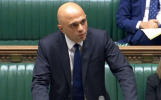
© Provided by The Telegraph The Health Secretary clarified that mandatory vaccines would not work ‘at a practical level' in the UK - PRU/AFP via Getty Images
Boris Johnson warned earlier this week that while he does not want a society where people are forced to receive vaccinations, using restrictions to control the spread of coronavirus cannot carry on “indefinitely”.
His hint that mandatory jabs may be considered by the Government sparked open revolt among Tory backbenchers.
Peter Bone decried the idea as “completely outrageous”, telling BBC Two’s Newsnight programme that “I’d be the first to say the PM should go” if it were implemented. Alexander Stafford, who represents the “Red Wall” seat of Rother Valley, announced he too “cannot and will not support mandatory vaccinations”.
Members of the Cabinet and other ministers also harboured strong misgivings about the proposal, The Telegraph understands.
‘Everyone agrees it’s not the way forward’
One government source said: “Everyone agrees it’s not the way forward.”Another Whitehall insider told The Telegraph: “You would think it was only people like [Nazi doctor] Josef Mengele who would champion injecting people against their will. This is fascist nonsense and should be shunned by any freedom-loving man or woman in this country.”
The Health Secretary sought to calm the row on Thursday by stressing that getting vaccinated should be a positive choice and it would not be practical to force people to get jabs, as is being considered in some European countries.
Ursula von der Leyen, the president of the European Commission, has suggested that mandatory jabs should be considered across the EU.
Austria is set to enforce vaccination from February, while in Greece people over 60 who refuse a jab will face monthly fines from January.
Mr Javid said mandatory vaccination is “unethical and also at a practical level, it wouldn’t work”.
He said there is an exception in the case of health and care staff, working in a “high-risk” environment, where compulsory Covid-19 jabs are being introduced in England.
“But if you ask me about universal mandatory vaccination – as some countries in Europe have said that they will do – at a practical level I just don’t think it would work because getting vaccinated should be a positive decision,” he told BBC Radio 4’s Today programme.
UK ‘can’t keep going indefinitely’ with non-pharmaceutical interventions
At a Downing Street press conference on Wednesday, the Prime Minister said that, from the beginning of the pandemic: “I didn’t want us to have a society and a culture where we force people to get vaccinated. I don’t think that’s ever been the way we do things in this country”.However, he added that if the vaccines are shown to be capable of “holding” the omicron variant, then “there is going to come a point” when “we are going to have to have a conversation about ways in which we deal with this pandemic”.
Mr Johnson said: “I don’t believe we can keep going indefinitely with non-pharmaceutical interventions, restrictions on people’s way of life, just because a substantial proportion of the population still sadly, has not got vaccinated.”
On Thursday, the PM’s official spokesman said: “I think he was making a broader point on the intention to keep developing further mitigations against coronavirus and any subsequent mutations, be that polyvalent vaccinations or further therapeutics, like the antivirals that we’re rolling out.”
He said: “We recognise how challenging this is, and disheartening for the public to see us having to introduce further restrictions, albeit at a relatively limited level.
“And so we will do everything possible to continue to be at the cutting edge of this work. I think he was clear that he didn’t want us to have a society and culture where we forced people to get vaccinated.”
Covid-19 is showing the true colours of every nation.
TUJITEGEMEE
JF-Expert Member
- Nov 6, 2010
- 23,914
- 23,075
Man investigated for having 10 Covid jabs in one day
A New Zealander has ended up under investigation after he allegedly got up to 10 Covid-19 vaccine shots in a single day, impersonating other people reluctant to get vaccinated for cash.
TUJITEGEMEE
JF-Expert Member
- Nov 6, 2010
- 23,914
- 23,075
BioNTech CEO replies to claims he refused vaccination
The head and co-founder of a company that produces one of the most widely used Covid jabs, Ugur Sahin, has commented on an interview in which he revealed that he and his family had not been vaccinated.
TUJITEGEMEE
JF-Expert Member
- Nov 6, 2010
- 23,914
- 23,075
Yaani Congo DRC watu wanaingia na kutoka wanavyojua wao iko salama. Maajabu haya.
====
Kuna uwezekanao, imetengenezwa kolido ya Kenya, Uganda, na dRC kupitisha rasilimali za Congo!
Wacha1
JF-Expert Member
- Dec 21, 2009
- 16,681
- 8,233
Lifting of all COVID rules announced - with self-isolation set to go in March (msn.com)
Is the pandemic entering its endgame?
Mr Johnson signalled his intention to start treating COVID-19 more like flu, saying: "There will soon come a time when we can remove the legal requirement to self-isolate altogether, just as we don't place legal obligations on people to isolate if they have flu.
"As COVID becomes endemic, we will need to replace legal requirements with advice and guidance, urging people with the virus to be careful and considerate of others."
Just like what JPM said, ''we will need to live with this disease like any other.''
Tutakukumbuka daima kwenye uhai wetu kwa kuliokoa taifa kwenye janga la Uviko, na mema yote uliyolitendea taifa hili na kulipa heshima.
Is the pandemic entering its endgame?
Mr Johnson signalled his intention to start treating COVID-19 more like flu, saying: "There will soon come a time when we can remove the legal requirement to self-isolate altogether, just as we don't place legal obligations on people to isolate if they have flu.
"As COVID becomes endemic, we will need to replace legal requirements with advice and guidance, urging people with the virus to be careful and considerate of others."
Just like what JPM said, ''we will need to live with this disease like any other.''
Tutakukumbuka daima kwenye uhai wetu kwa kuliokoa taifa kwenye janga la Uviko, na mema yote uliyolitendea taifa hili na kulipa heshima.
Wacha1
JF-Expert Member
- Dec 21, 2009
- 16,681
- 8,233
London chaos: Huge protest hits capital as fury erupts at NHS Covid vaccine mandate (msn.com)
London chaos: Huge protest hits capital as fury erupts at NHS Covid vaccine mandate
Hundreds of protesters flocked to central London to remonstrate against mandatory coronavirus vaccination for NHS staff. Dramatic footage shows protesters dancing to Pink Floyd's Another Brick in the Wall, suggesting the Government's measures go too far and encroach on civil liberties. With the new rules coming into effect on April 1, there are serious question marks over what the future holds for up to 70,000 health care workers unless they get jabbed in the next 67 days. Today furious NHS staff and their supporters tried to raise awareness about the issue in a bid to overturn the new Covid mandate passed in Parliament.
The NHS100K is an initiative launched last November by a group of ambulance workers who are are desperate for freedom of choice and against the idea of compulsory vaccines.
As stated on their website, their aim is to "connect the 100,000 plus health and social care staff in the UK who, it is estimated, will lose their jobs on April 1, 2022, as well as all of those who support our freedom to choose".
The website adds: "NHS100k.com brings together NHS, care, and social work colleagues, vaccinated and unvaccinated, clinical staff and non-clinical, who are saying NO to a mandate.
"We stand united in favour of freedom of choice, bodily autonomy and informed consent."

© Subject Access, Twitter NHS staff protest against mandatory vaccine

GETTY Omicron
NHS staff face having their contracts terminated and being made redundant if they remain unvaccinated.
And the dearth of midwives in the UK could worsen, should the 2,000 unjabbed midwives choose not to get incoluated in the next 10 weeks. One of the protesters, Kerry, who was interviewed by MyLondon lifted the lid on why she refused to get jabbed.
She said: "I'm not an anti-vaxxer at all and had one vaccine. "I think I should make my own decisions about what I put in my body, I'm more than willing to lose my job over it."
Subject Access, Twitter Protesters in London
A number of hospital trusts and general practitioners have warned that if the new rule isn't scrapped there could be an alarming staff shortage.
Today's protests in the capital should serve to overturn the decision which could have disastrous repercussions, both for the workers financially and for the country's healthcare services in general should those 70,000 be given the marching orders.
A Department of Health and Social Care spokesperson said: "Health and social care workers look after the most vulnerable people in society, who could face serious health consequences if exposed to the virus.
"Ensuring staff are vaccinated is the right thing to do to protect patients and those in care.
The vast majority of NHS staff have had the vaccine which is our best defence against COVID-19."

© express.co.uk Covid vs flu
Tory backbencher and former Government chief whip Mark Harper, who is now chairman of the Covid Recovery Group of Conservative MPs urged the government to rethink their decision as the country cannot afford to lose so many nurses.
Mr Harper said: "Mandatory vaccination of NHS and social care staff is not justified by the evidence, two doses provide weak or no protection against infection [by the Omicron variant] and even after a booster it wanes quickly after 10 weeks.
"Practically, the NHS and our social care system cannot afford to lose tens of thousands of skilled dedicated staff at any time but certainly not now.
"It's now urgent for the Government to rethink, drop the policy and deliver protection through testing instead."
Kuchanja ni hiari.
London chaos: Huge protest hits capital as fury erupts at NHS Covid vaccine mandate
Hundreds of protesters flocked to central London to remonstrate against mandatory coronavirus vaccination for NHS staff. Dramatic footage shows protesters dancing to Pink Floyd's Another Brick in the Wall, suggesting the Government's measures go too far and encroach on civil liberties. With the new rules coming into effect on April 1, there are serious question marks over what the future holds for up to 70,000 health care workers unless they get jabbed in the next 67 days. Today furious NHS staff and their supporters tried to raise awareness about the issue in a bid to overturn the new Covid mandate passed in Parliament.
The NHS100K is an initiative launched last November by a group of ambulance workers who are are desperate for freedom of choice and against the idea of compulsory vaccines.
As stated on their website, their aim is to "connect the 100,000 plus health and social care staff in the UK who, it is estimated, will lose their jobs on April 1, 2022, as well as all of those who support our freedom to choose".
The website adds: "NHS100k.com brings together NHS, care, and social work colleagues, vaccinated and unvaccinated, clinical staff and non-clinical, who are saying NO to a mandate.
"We stand united in favour of freedom of choice, bodily autonomy and informed consent."

© Subject Access, Twitter NHS staff protest against mandatory vaccine

GETTY Omicron
NHS staff face having their contracts terminated and being made redundant if they remain unvaccinated.
And the dearth of midwives in the UK could worsen, should the 2,000 unjabbed midwives choose not to get incoluated in the next 10 weeks. One of the protesters, Kerry, who was interviewed by MyLondon lifted the lid on why she refused to get jabbed.
She said: "I'm not an anti-vaxxer at all and had one vaccine. "I think I should make my own decisions about what I put in my body, I'm more than willing to lose my job over it."
Subject Access, Twitter Protesters in London
A number of hospital trusts and general practitioners have warned that if the new rule isn't scrapped there could be an alarming staff shortage.
Today's protests in the capital should serve to overturn the decision which could have disastrous repercussions, both for the workers financially and for the country's healthcare services in general should those 70,000 be given the marching orders.
A Department of Health and Social Care spokesperson said: "Health and social care workers look after the most vulnerable people in society, who could face serious health consequences if exposed to the virus.
"Ensuring staff are vaccinated is the right thing to do to protect patients and those in care.
The vast majority of NHS staff have had the vaccine which is our best defence against COVID-19."

© express.co.uk Covid vs flu
Tory backbencher and former Government chief whip Mark Harper, who is now chairman of the Covid Recovery Group of Conservative MPs urged the government to rethink their decision as the country cannot afford to lose so many nurses.
Mr Harper said: "Mandatory vaccination of NHS and social care staff is not justified by the evidence, two doses provide weak or no protection against infection [by the Omicron variant] and even after a booster it wanes quickly after 10 weeks.
"Practically, the NHS and our social care system cannot afford to lose tens of thousands of skilled dedicated staff at any time but certainly not now.
"It's now urgent for the Government to rethink, drop the policy and deliver protection through testing instead."
Kuchanja ni hiari.
Chamoto
JF-Expert Member
- Dec 7, 2007
- 8,319
- 17,473
Hawataki hata kuitaja Tanzania ila matendo yao ya sasa yanaonesha kuwa wametufanyia tathmini na kuona JPM alikuwa sahihi.Just like what JPM said, ''we will need to live with this disease like any other.''
Tutakukumbuka daima kwenye uhai wetu kwa kuliokoa taifa kwenye janga la Uviko, na mema yote uliyolitendea taifa hili na kulipa heshima.
TUJITEGEMEE
JF-Expert Member
- Nov 6, 2010
- 23,914
- 23,075
Hawataki hata kuitaja Tanzania ila matendo yao ya sasa yanaonesha kuwa wametufanyia tathmini na kuona JPM alikuwa sahihi.
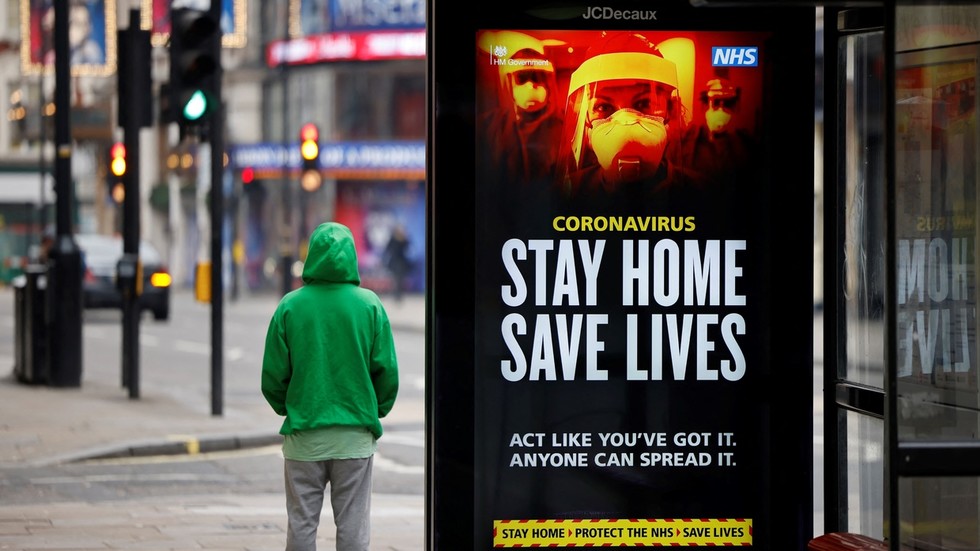
Secret govt unit used ‘unethical’ fear tactics to push Covid rules compliance – media
UK MPs to probe Downing Street’s ‘nudge unit’ over concerns of ‘grossly unethical’ use of scare tactics to coerce the public, media reports
Chamoto
JF-Expert Member
- Dec 7, 2007
- 8,319
- 17,473
Bro, iangalie hii clip ya Dr. Malone (3hr long podcast) kuhusu saga yote ya covid. Huyu Dr. ndiye aliyehusika na ugunduzi wa mRNA technology miaka ya 80.
Secret govt unit used ‘unethical’ fear tactics to push Covid rules compliance – media
UK MPs to probe Downing Street’s ‘nudge unit’ over concerns of ‘grossly unethical’ use of scare tactics to coerce the public, media reportswww.rt.com
Wacha1
JF-Expert Member
- Dec 21, 2009
- 16,681
- 8,233
Was Sweden right about Covid all along? (msn.com)
Credit: Fraser Nelson (Telegraph)
To understand Sweden, you need to understand a word that’s hard to explain, let alone translate: lagom. It means, in effect, “perfect-simple”: not too much, not too little. People who are lagom don’t stand out or make a fuss: they blend right in – and this is seen as a virtue.

© Provided by The Telegraph While Britain locked down like the rest of the world, Sweden became the defiant outlier
Essays are written about why lagom sums up a certain Swedish mindset – that it’s bad to stand out, to consider yourself better or be an outlier. That’s why it’s so strange that, during the lockdowns, Sweden became the world’s defiant outlier.
Swedes saw it the other way around. They were keeping calm and carrying on: lockdown was an extreme, draconian, untested experiment. Lock up everyone, keep children out of school, suspend civil liberties, send police after people walking their dogs – and call this “caution”? Anders Tegnell, Sweden’s state epidemiologist, never spoke about a Swedish “experiment”. He said all along he could not recommend a public health intervention that had never been proven.
Tegnell also made another point: that he didn’t claim to be right. It would take years, he’d argue, to see who had jumped the right way. His calculation was that, on a whole-society basis, the collateral damage of lockdowns would outweigh what good they do. But you’d only know if this was so after a few years. You’d have to look at cancer diagnosis, hospital waiting lists, educational damage and, yes, count the Covid dead. Almost two years on, we can look at the early indications.
The problem with lockdowns is that no one looks at whole-society pictures. Professor Neil Ferguson’s team from Imperial College London admitted this, once, as a breezy aside. “We do not consider the wider social and economic costs of suppression,” they wrote in a supposed assessment of lockdown, “which will be high.” But just how high? And were they a price worth paying?
As Sweden abolishes all domestic Covid restrictions, it emerges with one of Europe’s lower Covid death tolls: the rate is 1,614 per million people, just over half the amount of Britain (2,335). Given that our death tolls were comparable at first (both among the worst anywhere), it’s hard to argue that there’s some demographic force which meant Covid was never going to spread in Sweden.
Nor is it possible to argue that Sweden was some hedonistic party-nation: its people were incredibly cautious. But unlike Brits, they had a government that trusted them.
There were some Swedish diktats: a “rule of eight” was set up for a while. Bars, restaurants and cafes were all socially distanced and, at one point, had to close by 8.30pm. For a few weeks, Swedes even had vaccine passports. But that was about it: the rest was guidance, and it was followed.
What no statistic can convey is just how careful Swedes were; something that struck me whenever I’d visit. It was perfectly legal to meet up in bars and for a fika in a coffee shop, but most didn’t. A friend of mine had a rule that she’d only ever meet friends outside – even in the Stockholm winter (she did this so much that she got frostbite). In summer last year, studies showed Swedes working from home more than in any other European country.
This kept Covid low, while the lack of rules allowed for people to use their judgement while minimising economic and social damage. Sweden’s GDP fell by 2.9 per cent in 2020, while Britain’s collapsed by 9.4 per cent. Both have bounded back, but Sweden’s economy is this year expected to be five per cent larger than before the pandemic, versus two per cent for Germany. The UK will be about one per cent, one of the lowest figures in Europe.
The cost of the various Covid measures is best summed up by the debt mountain: an extra £8,400 per head in Britain, and £3,000 in Sweden.
Swedish schools kept going throughout, with no face masks. Sixth-formers and undergraduates switched to home learning, but the rest of Swedish children went to school as normal. That’s not to say there weren’t absences as the virus spread: it was common to see a third, at times even half of the class absent due to sniffles or suspected Covid. But there were no full-scale closures and, aside from some suspicions about minor grade inflation (the average maths grade sneaked up to 10.1, from 9.3), there is no talk in Sweden about educational devastation.
In Britain, there is calamity and cover-up. By doling out more A grades than ever before – and telling universities to make more space – young people could be shovelled through the system with lost ground never recognised or quite made up.

© Provided by The Telegraph With coronavirus restrictions lifted, life in Sweden is returning to normal - Nora Lorek/Bloomberg
Grade inflation was staggering: the number of A-level students marked at A or A* jumped to 45 per cent, up from 26 per cent pre-pandemic, but no one doubts that these students learned far less. By some measures, educational inequality has been set back 10 years. But some problems are too big to admit.
Academics suggest the effect of lost education is permanent: less education inevitably means lower salaries and slower career progression. The Institute for Fiscal Studies talks about £40,000 of lost lifetime earnings per pupil in Britain, £350 billion in all. Swedish studies estimate that Covid’s impact (on absenteeism and home-learning) could mean an £800 million overall hit – far smaller than the impact on Britain’s lost school days.
The impact on hospital waiting lists is also very different. Fear of a virus keeps people away – at the peak of the first wave, attendance at Swedish A&E was 31 per cent lower than normal; in Britain, it collapsed by 57 per cent. Routine operations were down by 20 per cent in Sweden and 34 per cent in England, so waiting lists grew in both countries. As they did pretty much world over.
But no country, anywhere, has had a waiting list grow as big as Britain’s: from 4.4 million pre-pandemic, it will keep getting worse for two years and peak at about 9.2 million, according to NHS modelling – that’s equivalent to one in five adults.

© Provided by The Telegraph Anders Tegnell, Sweden’s state epidemiologist, said from the start that he could not recommend a public health intervention that had never been proven - MAGNUS ANDERSSON/TT News Agency/AFP via Getty Images
A top-down health service is more easily disrupted if it’s ordered to transform into a Covid service (and people are told to “protect the NHS” by not using it). Sweden’s waiting lists, 130,000 pre-pandemic, hit 170,000 last October. Even adjusting for population, it’s nowhere near the size of Britain’s problem.
Sweden will not declare victory. No one was properly prepared for Covid, and The country’s failure to protect care home residents is still seen as a national scandal. Sweden also took a bigger hit than its neighbours: Denmark, which did lock down, has more to shout about when it comes to combining a lower Covid hit with minimal economic disruption.
But, as Tegnell would say, it’s still too early to say – with any finality – who got it right and who didn’t.
Credit: Fraser Nelson (Telegraph)
To understand Sweden, you need to understand a word that’s hard to explain, let alone translate: lagom. It means, in effect, “perfect-simple”: not too much, not too little. People who are lagom don’t stand out or make a fuss: they blend right in – and this is seen as a virtue.
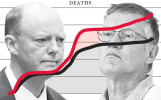
© Provided by The Telegraph While Britain locked down like the rest of the world, Sweden became the defiant outlier
Essays are written about why lagom sums up a certain Swedish mindset – that it’s bad to stand out, to consider yourself better or be an outlier. That’s why it’s so strange that, during the lockdowns, Sweden became the world’s defiant outlier.
Swedes saw it the other way around. They were keeping calm and carrying on: lockdown was an extreme, draconian, untested experiment. Lock up everyone, keep children out of school, suspend civil liberties, send police after people walking their dogs – and call this “caution”? Anders Tegnell, Sweden’s state epidemiologist, never spoke about a Swedish “experiment”. He said all along he could not recommend a public health intervention that had never been proven.
Tegnell also made another point: that he didn’t claim to be right. It would take years, he’d argue, to see who had jumped the right way. His calculation was that, on a whole-society basis, the collateral damage of lockdowns would outweigh what good they do. But you’d only know if this was so after a few years. You’d have to look at cancer diagnosis, hospital waiting lists, educational damage and, yes, count the Covid dead. Almost two years on, we can look at the early indications.
The problem with lockdowns is that no one looks at whole-society pictures. Professor Neil Ferguson’s team from Imperial College London admitted this, once, as a breezy aside. “We do not consider the wider social and economic costs of suppression,” they wrote in a supposed assessment of lockdown, “which will be high.” But just how high? And were they a price worth paying?
As Sweden abolishes all domestic Covid restrictions, it emerges with one of Europe’s lower Covid death tolls: the rate is 1,614 per million people, just over half the amount of Britain (2,335). Given that our death tolls were comparable at first (both among the worst anywhere), it’s hard to argue that there’s some demographic force which meant Covid was never going to spread in Sweden.
Nor is it possible to argue that Sweden was some hedonistic party-nation: its people were incredibly cautious. But unlike Brits, they had a government that trusted them.
There were some Swedish diktats: a “rule of eight” was set up for a while. Bars, restaurants and cafes were all socially distanced and, at one point, had to close by 8.30pm. For a few weeks, Swedes even had vaccine passports. But that was about it: the rest was guidance, and it was followed.
What no statistic can convey is just how careful Swedes were; something that struck me whenever I’d visit. It was perfectly legal to meet up in bars and for a fika in a coffee shop, but most didn’t. A friend of mine had a rule that she’d only ever meet friends outside – even in the Stockholm winter (she did this so much that she got frostbite). In summer last year, studies showed Swedes working from home more than in any other European country.
This kept Covid low, while the lack of rules allowed for people to use their judgement while minimising economic and social damage. Sweden’s GDP fell by 2.9 per cent in 2020, while Britain’s collapsed by 9.4 per cent. Both have bounded back, but Sweden’s economy is this year expected to be five per cent larger than before the pandemic, versus two per cent for Germany. The UK will be about one per cent, one of the lowest figures in Europe.
The cost of the various Covid measures is best summed up by the debt mountain: an extra £8,400 per head in Britain, and £3,000 in Sweden.
Swedish schools kept going throughout, with no face masks. Sixth-formers and undergraduates switched to home learning, but the rest of Swedish children went to school as normal. That’s not to say there weren’t absences as the virus spread: it was common to see a third, at times even half of the class absent due to sniffles or suspected Covid. But there were no full-scale closures and, aside from some suspicions about minor grade inflation (the average maths grade sneaked up to 10.1, from 9.3), there is no talk in Sweden about educational devastation.
In Britain, there is calamity and cover-up. By doling out more A grades than ever before – and telling universities to make more space – young people could be shovelled through the system with lost ground never recognised or quite made up.
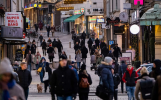
© Provided by The Telegraph With coronavirus restrictions lifted, life in Sweden is returning to normal - Nora Lorek/Bloomberg
Grade inflation was staggering: the number of A-level students marked at A or A* jumped to 45 per cent, up from 26 per cent pre-pandemic, but no one doubts that these students learned far less. By some measures, educational inequality has been set back 10 years. But some problems are too big to admit.
Academics suggest the effect of lost education is permanent: less education inevitably means lower salaries and slower career progression. The Institute for Fiscal Studies talks about £40,000 of lost lifetime earnings per pupil in Britain, £350 billion in all. Swedish studies estimate that Covid’s impact (on absenteeism and home-learning) could mean an £800 million overall hit – far smaller than the impact on Britain’s lost school days.
The impact on hospital waiting lists is also very different. Fear of a virus keeps people away – at the peak of the first wave, attendance at Swedish A&E was 31 per cent lower than normal; in Britain, it collapsed by 57 per cent. Routine operations were down by 20 per cent in Sweden and 34 per cent in England, so waiting lists grew in both countries. As they did pretty much world over.
But no country, anywhere, has had a waiting list grow as big as Britain’s: from 4.4 million pre-pandemic, it will keep getting worse for two years and peak at about 9.2 million, according to NHS modelling – that’s equivalent to one in five adults.

© Provided by The Telegraph Anders Tegnell, Sweden’s state epidemiologist, said from the start that he could not recommend a public health intervention that had never been proven - MAGNUS ANDERSSON/TT News Agency/AFP via Getty Images
A top-down health service is more easily disrupted if it’s ordered to transform into a Covid service (and people are told to “protect the NHS” by not using it). Sweden’s waiting lists, 130,000 pre-pandemic, hit 170,000 last October. Even adjusting for population, it’s nowhere near the size of Britain’s problem.
Sweden will not declare victory. No one was properly prepared for Covid, and The country’s failure to protect care home residents is still seen as a national scandal. Sweden also took a bigger hit than its neighbours: Denmark, which did lock down, has more to shout about when it comes to combining a lower Covid hit with minimal economic disruption.
But, as Tegnell would say, it’s still too early to say – with any finality – who got it right and who didn’t.
Wacha1
JF-Expert Member
- Dec 21, 2009
- 16,681
- 8,233
Boris hails 'moment of pride' as he unveils 'Living With Covid' plan TODAY | Daily Mail Online
Chaos as Cabinet meeting to sign off Boris's 'Living With Covid' plan axing self-isolation is delayed just MINUTES before it was due to start as Scotland and Wales condemn 'unacceptable' end of free tests
Boris Johnson is laying out 'Living With Covid' plan including an end to the legal self-isolation requirement
The PM will also lay out plans to scrap free Covid tests despite anxiety from Tories about tracking outbreak
Labour and medics raised concerns legal underpinning being abandoned too soon to distract from Partygate
By JAMES TAPSFIELD, POLITICAL EDITOR FOR MAILONLINE
PUBLISHED: 08:30, 21 February 2022 | UPDATED: 12:14, 21 February 2022
Boris Johnson's grand 'Living With Covid' set-piece was thrown into confusion today after a Cabinet meeting to sign off the plan was delayed with almost no notice.
Ministers were informed with almost no notice that the gathering to finalise the strategy for England - including axing self-isolation this week - was being pushed back.
Mr Johnson is expected to make a Commons statement later laying out the blueprint, and a timetable for scrapping 'free' tests which have been costing the taxpayer around £2billion a month.
But Cabinet sources confirmed to MailOnline that the meeting has not started on time, with wrangling thought to be ongoing over testing provision. 'There is a row brewing,' one said.
Others suggested that Mr Johnson was receiving fresh briefing about Ukraine, while Chancellor Rishi Sunak and Health Secretary Sajid Javid - neither of whom were seen arriving in Downing Street this morning - try to thrash out differences.
Although Tories have welcomed the decision to tear up laws that have underpinned the government's response to the pandemic, some have voiced fears that charging for lateral flows and PCRs could cause serious problems.
Free provision looks likely to be kept in place for over-80s and the most vulnerable, but Mr Sunak is said to be resisting pressure from Mr Javid for more funding and a slower timetable for ending the arrangements.
Nicola Sturgeon warned that the end of testing could prevent the UK reacting to new variant threats, while Wales branded the idea 'unacceptable'. Although the devolved administrations have policy-making powers, their hand could be forced by Westminster turning off the spending taps.
There are also concerns that employers and workers face confusion when self-isolation rules lapse. In a round of interviews this morning, business minister Paul Scully said people should still stay at home if they have a 'transmissible disease' - although he stressed it had to be discussed between staff and bosses.
Mr Johnson is due to make a statement to the House of Commons this afternoon, before holding a coronavirus press conference in Downing Street this evening - although the timings look to be slipping badly.
Shadow health secretary Wes Streeting said: 'What confidence can the public have that the Conservatives are acting in the national interest when they can't agree a plan for Covid?
'It is clear the Prime Minister was trying to declare victory before the war is over, simply to distract from the police knocking at the door of Number 10.'
On a critical day that could finally start to draw a line under the pandemic:
- Ministers have denied that the timing of the lockdown announcement is a 'smokescreen' to distract from Mr Johnson's Partygate woes;
- A leading expert has insisted that Covid booster jabs will not need to be given to all Britons in future;
- Nicola Sturgeon is due to unveil her pandemic plan tomorrow with doubts over whether Scotland and Wales will follow the same path as England.
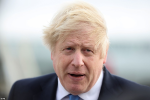
Boris Johnson (pictured) is hoping to lay out a 'Living With Covid' strategy to MPs later today
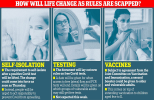
You will hear our beloved leaders .... .... oops thieves echoing their masters.
Similar Discussions
-
This is how they plan to eventuallylock down planet Earth
- Started by Mathanzua
- Replies: 9
-
Why Stress is Ruining Your Health: The Hidden Epidemic and How to Fight Back
- Started by Mwl.RCT
- Replies: 1
-
Tanzania’s unmatched geopolitical status factor to become regional hub in trade and commerce
- Started by Wamanyaki
- Replies: 0
-

